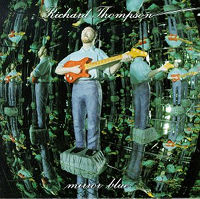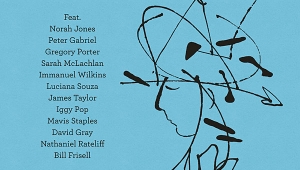| Columns Retired Columns & Blogs |
Recording of June 1994: Mirror Blue
RICHARD THOMPSON: Mirror Blue
Capitol CDP 7 81492 2 (CD). Tchad Blake, eng.; Mitchell Froom, prod. AAD. TT: 55:13
Capitol CDP 7 81492 2 (CD). Tchad Blake, eng.; Mitchell Froom, prod. AAD. TT: 55:13
According to the Capitol flacks, Mirror Blue is Richard Thompson's "most accessible release yet." But don't believe everything you read, especially in a press kit.
 It's true that the production, again by Mitchell Froom, is smooth and inviting. And it's true that Thompson has quietly become one of pop's most expressive singers. But from a man who's made a career of being rock's most famous cult figure (or was that its most obscure major artist?), accessible is, at best, a relative term.
It's true that the production, again by Mitchell Froom, is smooth and inviting. And it's true that Thompson has quietly become one of pop's most expressive singers. But from a man who's made a career of being rock's most famous cult figure (or was that its most obscure major artist?), accessible is, at best, a relative term.
Take "Shane and Dixie," a rollicking tale of two hoodlums who walk the line between Bonnie & Clyde and Romeo & Juliet. The verses tell the grisly but hilarious saga of a botched double suicide, staged with one eye on the tabloid headlines, while the chorus bops along blithely in true pop fashion: "Fame and love / Fame and love / Fame and love will never die." If irony were a controlled dangerous substance, Thompson would be dead or behind bars.
Mirror Blue picks up where 1991's R2D4, Rumor and Sigh, left off; to my ear, it's both slower to reveal itself, and ultimately maybe even better. The songs depict a series of emotional false starts and romantic dead ends, and the only thing that's really clear is that things aren't what they seem.
Track after track, Thompson depicts the things we do for love in detail that's too close for comfort. And there's no split along gender lines; in "For the Sake of Mary," our hero "kicked the reds" and "junked the juice" and got a new tattoo all for romance, while his ex features "glycerine in the tears...rouge in the blush...All passion to the eye / All cold to the touch" in "The Way that it Shows." And you can't even escape this masquerade ball by taking a nap; "I Can't Wake Up to Save My Life" is the Everly Brothers' "Dream" as interpreted by Freud.
All this uncomfortable dancing at arm's length leads Thompson's would-be lovers in different directions, from the wistful regrets of a soulmate held too tightly in "Beeswing" to the stalkeresque obsession of "I Ride in Your Slipstream." The album closes with "Taking My Business Elsewhere," a three-in-the-morning, tears-in-your-beer ballad that Frank Sinatra could cover comfortably. The least conflicted of Mirror Blue's love songs is "MGB-GT," and that one's sung in homage to a sports car.
The sound is, again, reference quality. With Mitchell Froom and Tchad Blake behind the glass, the production is tailored carefully to each song: sometimes intimate, sometimes more baroque, but never intrusive. The soundstage is deep and wide, the bass has real sock, and Thompson's voice is front-and-center like it oughta be.
All this relationship stuff could be a little tedious in the hands of a lesser artist. But given Thompson's way with a melody, his droll sense of humor, and his incomparable guitar accompaniment, this record is a joy. Don't expect Ace of Base, but Mirror Blue is Richard Thomspon at his elusive, straightforward, obscure, accessible best.—Allen St. John
- Log in or register to post comments




































